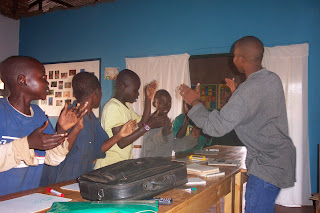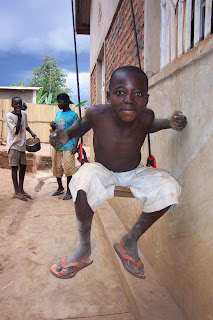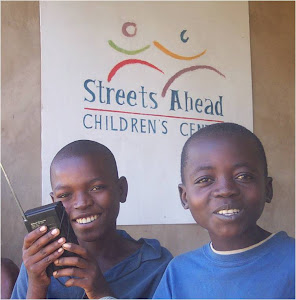The past three days have been more intensive than usual.
Monday, shortly after returning at 7pm from a day in Kigali trying to sort out my visa with an incompetent immigration official who kept losing my documentation, one of the boys, Jean Bosco, turned up at the centre with a huge dent in his forehead and blood pouring out of his nose and mouth after someone had taken a brick to his head.
So we went to wake up the hospital’s emergency department. Someone in a doctor’s coat examined him and to my disbelief said there was “no problem”. Then Jean Bosco seemed to take a turn and couldn’t speak. Finally I persuaded the ‘doctor’ that perhaps the hole in his head, his loss of speech and the blood coming out of his nose and mouth might suggest there was a problem after all. Perhaps an injury to the head is a little different to an injury to an arm since there’s a brain inside. He announced that he was going to call the doctor.
The doctor finally arrived, conducted the same pathetically inept and inadequate examination, and then announced again that there was “no problem”. No he didn’t need to have a scan. Scans were too expensive anyway. There were clinical signs if there was an internal problem and he didn’t have any of them.
Just as I asked him for the third time if this was his son and money was not an issue, would he really only recommend that he be kept in overnight for observation, Jean Bosco contorted spastically, his knees came up to his chest, his arms bent up, his mouth stretched in a frozen silent scream and he had a seizure and fit. I don’t think I have ever felt such fear, to be stood beside a boy I feared was going to die before me, unable to help him and without any faith in the medical staff. There ensued a frenzied panic among everyone but the doctor who seemed stunned.
The doctor did nothing but announce to the onlookers, in a face saving effort, that it was a reaction to the drugs. Which drugs would they be - you haven’t given him anything? They gave Jean Bosco something and put him on a drip and his seizure past. I announced I was taking him to Kigali immediately for a scan and treatment. Fine, the ambulance is 15,000 francs. No problem. Please can you put Jean Bosco in the ambulance with a nurse. Yes.
I disappeared for a moment to speak to my social worker who’d turned up and then returned. Why is nothing happening? Why is the ambulance not outside? You must pay first. Okay, here’s the money. You must complete some forms first. Where are the forms? Someone will fetch them from the office. Five minutes later I have the forms.
Meanwhile the doctor has decided Jean Bosco is going to die and is just saying it over and over aloud. Someone tranquiliser the *?!@# doctor before I do. I then had to run across the hospital to another office to pay up. Finally, proof of payment in my hand, the ambulance moves. Then the doctor wants the ambulance to take him home first. Sandra, our fundraiser who’s there with me, goes loopy at him and he cowers away.
I ask my social worker if he’ll come with me to Kigali to help make things happen and translate. He looks down and explains that he would but he’s wearing flip flops. I am in disbelief and despair, again. Jean Bosco is wheeled out. But they can’t figure out how the trolley bed in the ambulance works so no less than six nurses and trainee nurses literally tug and pull and push him up into the ambulance and onto the trolley bed. God knows what damage they do to people with spinal injuries.
Is there a nurse coming with me? Yes, of course. Where is he? They point. The nurse is sitting in the passenger seat in the front cabin with the driver and the ambulance guard. What use is he there? Finally the staff, Jean Bosco, his friend Eramu, Sandra and I set off for Kigali, to the hospital with a scanning machine.
The journey was largely uneventful to my relief. I sat in the back with him shinning a torch over his bed since the ambulance was bare. He threw up a few times, coughed up more blood and managed to disconnect his drip so it spurted all over the ambulance as we bounced over the pot holes and bumps of the worst main road in Rwanda.
We arrived at the hospital and I carried him in as he continued to throw up left, right and centre, and put him in a wheelchair in the A&E reception. But it was as if the staff in reception were oblivious to him. They didn’t move. The door to the operating room was open. Five staff were slumped out on the operating table and cabinets, socialising, indifferent and nonchalant. Why are you not helping him? Some reluctantly moved but they wouldn’t approach him until he’d finished throwing up.
Finally they conducted an examination. There’s no problem. He’s just drunk. Excuse me. Peculiarly the huge dent in his head had disappeared, presumably because of blood building up behind the depressed skull so I could understand their reaction a little, but I knew he had had a huge dent, had had a seizure and hadn’t been drinking.

I showed them a digital camera picture of his head when he’d arrived at the centre. No he’s just drunk. But he hasn’t been drinking tonight and look, he had a huge dent in his skull and he had a seizure and fit and can’t speak. Why do you not accept he is just drunk? Because he’s not. Maybe it is his first time drinking. No. Maybe he has religion that says he cannot drink but today he drank and he is now feeling very bad. No. Look at the picture. Look at the blood.
I want him to have a head scan please. We don’t have a scanner. The only scanner is at the King Faisal Hospital. But the doctor in Rwamagana said it was here - he sent the ambulance here. We have an x-ray machine. I decided we’d might as well have an x-ray since we were here if it was going to be quick.
Miraculously it was quick. The x-rays didn’t look very clear but we took them back to the doctor anyway. While we waited for the doctor to examine the x-rays, they found a bed for him and put him on another drip. The doctor announced that he had a fracture. Really, that is enlightened. What does he need? Nothing, there’s no problem. That was that.
We sat up for the rest of the night keeping watch as he slept with Eramu curled up at the bottom of the bed. By 3am we were desperate for a break, some refreshment and something to revive us so we escaped for a bizarre hour at the neighbouring new Intercontinental hotel. Kind of difficult to get your head around such an experience when you live day to day in a very different world and you’ve just had an evening like that.
I got an hour’s restless sleep slumped in a wheelchair in the corridor outside Jean Bosco’s ward. I woke at 6 to lots of hospital staff laughing at the muzungus sleeping in the hospital. Sandra headed back to Rwamagana and I stayed put. Jean Bosco’s recovery seemed miraculous. He was smiling and speaking again and I was relieved and bemused beyond belief.

On the morning round the nurses said he could be discharged. Well or not I was happy to get him out of the hospital. Getting him discharged though took me 4 hours of bureaucracy and complications. Part of the process involves queuing up for a final examination by a specialist doctor. It was good to speak to someone who seemed qualified and competent but she took one look at the x-rays and confirmed my suspicions – they were useless because they didn’t show her anything, good or bad. We were sent back to get more done.
Two hours later they had x-rays that confirmed his fracture but he was still discharged. Then I had to wait 3 ½ hours for the car to pick us up. Whilst waiting I discovered Jean Bosco’s mother had come down to Rwamagana from her village. Someone had told her last night that he was dead. She had brought with her some villagers to go to Kigali to collect his body. I put them both on the phone and her grieving ended…
Finally we made it home just before 7pm. I gave him something to eat, set up a mat and blanket for him, and went to bed exhausted, 38 hours after I’d woken up on Monday morning. 9.42am the morning after and I’m woken by a panic. The authorities are in the town forcibly rounding up the street children. They do this every now and then in the towns. For entertainment it would seem. They lock them up, lecture them, beat them, send some of them to the old psychiatric hospital for ‘rehabilitation’, dump then in less conspicuous places in the country. It’s the pinnacle of Rwanda’s enlightened social care system.
So I have my four staff and Sandra running around the market trying to get the kids back to the centre where I can keep the authorities away. But three were caught and taken away on a truck. The authorities had rounded up ANY kids present in the market and when I arrived at the sector offices I found 200 or so frightened children from 6 or 7 years upwards imprisoned in a baking room.
Outside the authorities were criticising our approach and efforts, saying we had done nothing for our children, we hadn’t given them clothes, their behaviour hadn’t changed etc. Parents crowded around in a panic – some of the children had been helping them to carry and sell things in the market, some had been shopping with them, some did attend primary school but were on the afternoon rotation…
Four hours later, after lots of heated conversations about the programme and public relations, some of the local leaders had softened their attitude. Finally, they started releasing the children after they’d spoken to each child and their guardians. Those without guardians probably remain imprisoned until someone comes forward in their defence. Tomorrow’s job maybe going to the defence of those who had no guardian come to their defence… That’s all for now... I’m grinding to a halt again.
















.JPG)





.JPG)










.JPG)
.JPG)
.JPG)









.JPG)










